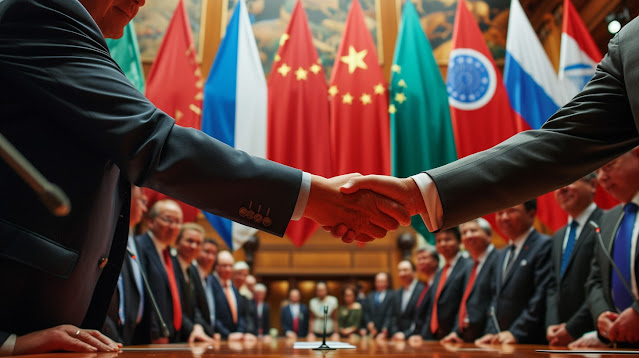Submit Review: The Ethics of Surveillance in National Security: Balancing Privacy and Protection
The Ethics of Espionage and Surveillance in National Security: Balancing Privacy and Protection
The Ethics of Espionage and Surveillance in the Name of National Security
Introduction
In a world where national security is often cited as the paramount concern, the practices of espionage and surveillance have become deeply embedded in statecraft. Governments assert that these tools are vital for protecting citizens from threats, yet they also raise profound ethical questions. When does the pursuit of security infringe upon individual freedoms? How can nations balance the need for protection with the preservation of privacy?
These questions have only grown more urgent in the digital age, where technology has enabled unprecedented levels of monitoring and data collection. This article explores the ethical dilemmas surrounding espionage and surveillance in the name of national security, examining their impact on privacy, trust, and democratic values. It also discusses potential solutions that could help navigate these complex issues.
The Necessity of Espionage in National Security
Espionage, or the practice of gathering secret information, has been a staple of national security efforts for centuries. From ancient times to the Cold War, and now into the age of cyber intelligence, espionage has evolved but its core purpose remains the same: to gather intelligence that could prevent or mitigate threats to a nation’s security.
Today, espionage often involves sophisticated cyber operations, satellite surveillance, and the monitoring of digital communications. These activities are justified by governments as essential for identifying potential threats, understanding foreign powers, and maintaining a strategic advantage. Yet, while the rationale for espionage is often clear, the methods used can be ethically contentious.
Ethical Concerns in Modern Espionage
The ethical issues surrounding espionage stem largely from its secretive nature. When governments engage in espionage, they often do so without the knowledge or consent of those being monitored, including citizens, foreign governments, and even allies. This lack of transparency raises questions about accountability and the potential for abuse.
For example, espionage activities that involve hacking into foreign networks, stealing intellectual property, or surveilling civilians can blur the lines between legitimate security measures and outright violations of sovereignty and privacy. Moreover, the use of espionage against allies can undermine trust and damage diplomatic relations, raising further ethical concerns.
Key Concepts:
- Ethical dilemmas in espionage
- Privacy vs. security
- Accountability and transparency
- Diplomatic consequences of espionage
Surveillance: A Tool for Security or a Threat to Freedom?
Surveillance, defined as the monitoring of behavior and communications, has become a ubiquitous aspect of modern life. Governments around the world use surveillance to track potential threats, monitor criminal activity, and enforce laws. However, the rise of digital technology has vastly expanded the scope and scale of surveillance, making it easier than ever to collect and analyze vast amounts of data.
Mass surveillance programs, such as those revealed by whistleblowers like Edward Snowden, have sparked global debates about the balance between security and privacy. While governments argue that such programs are necessary to prevent terrorism and other serious threats, critics contend that they constitute a gross violation of civil liberties.
The Ethical Implications of Mass Surveillance
The primary ethical concern with mass surveillance is its potential to infringe on the privacy rights of individuals. When governments collect data on a large scale, they often do so without the explicit consent of those being monitored. This can include everything from phone records and internet activity to location tracking and even biometric data.
The implications of such widespread surveillance are profound. Individuals may feel that their every move is being watched, leading to a chilling effect on free expression and a reduction in the openness of public discourse. Additionally, the storage and use of this data by governments raise concerns about who has access to the information and how it might be used or misused.
Key Concepts:
- Mass surveillance and civil liberties
- Privacy rights in the digital age
- The chilling effect on free speech
- Data security and potential misuse
Balancing National Security and Individual Rights
One of the most pressing issues in the debate over espionage and surveillance is the need for robust legal and ethical oversight. Without clear guidelines and accountability mechanisms, there is a significant risk that these practices could be abused, leading to violations of human rights and the erosion of democratic norms.
Independent oversight bodies, such as parliamentary committees or judicial review boards, can play a crucial role in ensuring that espionage and surveillance activities are conducted within the bounds of the law. These bodies can also provide a check on executive power, ensuring that the government does not overreach in its pursuit of security.
Furthermore, international agreements and norms can help establish a global framework for ethical espionage and surveillance. Treaties that set standards for intelligence gathering and data protection can help prevent conflicts and ensure that nations respect each other’s sovereignty and citizens’ rights.
Proposing Solutions: Enhancing Privacy and Accountability
Stronger Legal Protections for Privacy: Governments should enact laws that clearly define the limits of surveillance and espionage, including the requirement for warrants or judicial approval before certain types of monitoring can take place. These laws should also provide mechanisms for citizens to challenge surveillance if they believe their rights have been violated.
Transparency and Public Disclosure: Transparency is key to maintaining public trust in government surveillance programs. Governments should be required to disclose information about their surveillance activities, including the scope, purpose, and oversight mechanisms in place. Public reports and audits can help ensure that surveillance is conducted responsibly and ethically.
Adopting Privacy-Enhancing Technologies: The development and use of privacy-enhancing technologies (PETs) can help balance the need for security with the protection of individual rights. These technologies, such as encryption and anonymization, can enable governments to collect necessary intelligence without compromising the privacy of citizens.
International Cooperation and Norms: Given the global nature of espionage and surveillance, international cooperation is essential. Nations should work together to establish norms and agreements that regulate these practices, ensuring that they are conducted in a manner that respects human rights and international law.
Key Concepts:
- Legal oversight of espionage and surveillance
- Privacy-enhancing technologies
- Transparency in government surveillance
- International norms and agreements
Conclusion
The ethics of espionage and surveillance in the name of national security present a complex and multifaceted challenge. While these practices are often justified as necessary for protecting citizens and maintaining global stability, they also pose significant risks to privacy, trust, and democratic values.
To navigate these challenges, it is essential to strike a balance between security and individual rights. This requires robust legal and ethical oversight, the adoption of privacy-enhancing technologies, and international cooperation to establish norms and standards. By taking these steps, governments can ensure that espionage and surveillance serve their intended purpose without undermining the very freedoms they aim to protect.
In an era of rapid technological change and growing global interconnectedness, the need for thoughtful and principled approaches to national security has never been greater. As we continue to grapple with the ethical implications of espionage and surveillance, it is crucial that we remain vigilant in defending the rights and freedoms that are the foundation of our democratic societies.













Comments
Post a Comment